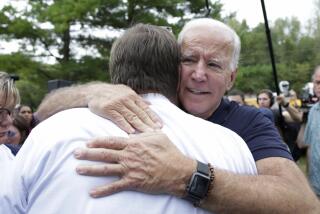Depression’s Message on Luckless Is Timeless
- Share via
The Great Depression marked those of us who lived through it in many ways, some good, some bad. For instance, it still sets my teeth on edge to see food left on plates or thrown away, and I tend to wear clothes and drive cars long after both have become dysfunctional. Those scars of the Depression may not mean much today, but one highly affirmative quality I think most of us carried out of that time was compassion. When millions of people around you are down on their luck, you tend to be considerably less judgmental about your fellow man--especially if you’ve been in the same place.
I’ve been thinking about that as I watch the cavalier way in which the city of Santa Ana is confiscating the possessions of its homeless. If compassion is playing any role in this, it certainly isn’t visible. I find it impossible to believe that any of the people responsible for this travesty could have lived through the Great Depression--or even studied it with any understanding.
The experiences of two periods I find almost impossible to explain to young people today are the agony of the 1930s and the euphoria of the John F. Kennedy presidency.
It startles me when I talk to high school and college students now and realize that Kennedy is almost as remote a figure to them as Grover Cleveland or William McKinley was to me in my youth. Their knowledge of Kennedy, such as it is, seems to come mostly from revisionist writings that bury his greatest contribution in shovels full of social and political criticism and gossip about his womanizing.
The fact is that for the three magnificent years of the Kennedy presidency, this country was an exciting, pulsating, energized community of people feeling good about themselves, their nation and their young President.
I’m not talking about specific areas of Kennedy’s performance--either personal or political--that are debatable. I’m talking about the feeling that penetrated deep to the roots of this country under Kennedy. It was tangible--and it hasn’t happened since.
I can still feel it when I shut my eyes and put myself back into those years, but I don’t know how to convey that to young people. It requires a suspension of the cynicism and the pragmatism so prevalent today.
The same thing is true of the Great Depression, but in a different way. To understand it requires suspension of the drive for a life style based on instant gratification and dependent on a credit economy. Poverty hit middle-class Americans in devastating ways, so we were drawn together in vast numbers by common hurts and needs.
Those memories are vivid too. My father lost a chain of variety stores one by one. He had a nervous breakdown and ended up in a hospital many miles away. The neighbor across the street bought an insurance policy, then hanged himself in the garage, hoping that his family could continue to live in the home he was about to lose along with his job. I found him. I had gone to borrow something for my mother and had been sent to the garage to find it. The sight of that dangling body, glimpsed for a fraction of a second before I ran, will always be with me.
People we knew socially were hungry, were losing their jobs and their homes, were forced to swallow the pride that had been part of their families for generations and seek public help. Through all this suffering, however, there was a quite remarkable sense of community.
Most of today’s homeless--like most of the people who required help during the Depression years--are not in trouble by choice. They have been clobbered by circumstances, often ones beyond their control. They need help and understanding and compassion--not violence to their belongings.
More to Read
Sign up for Essential California
The most important California stories and recommendations in your inbox every morning.
You may occasionally receive promotional content from the Los Angeles Times.










